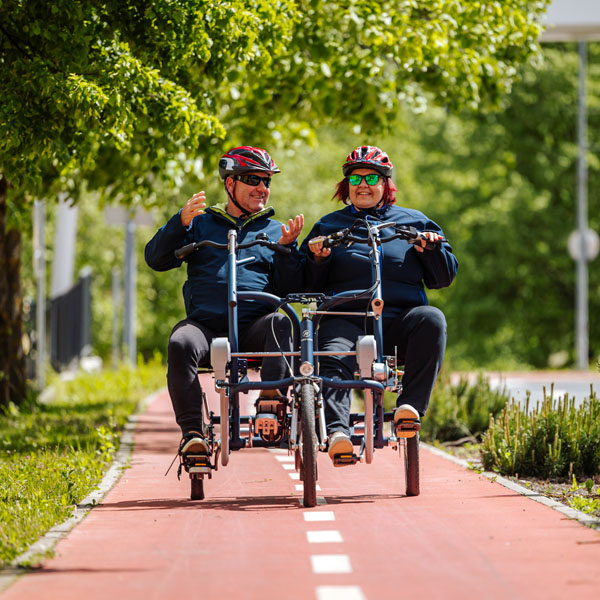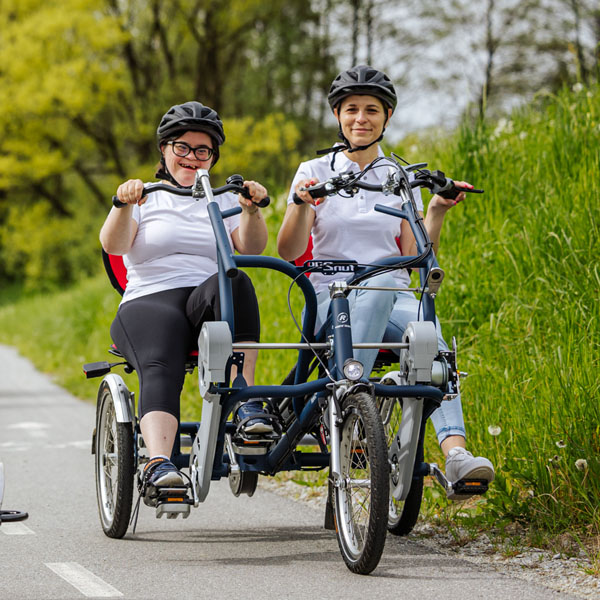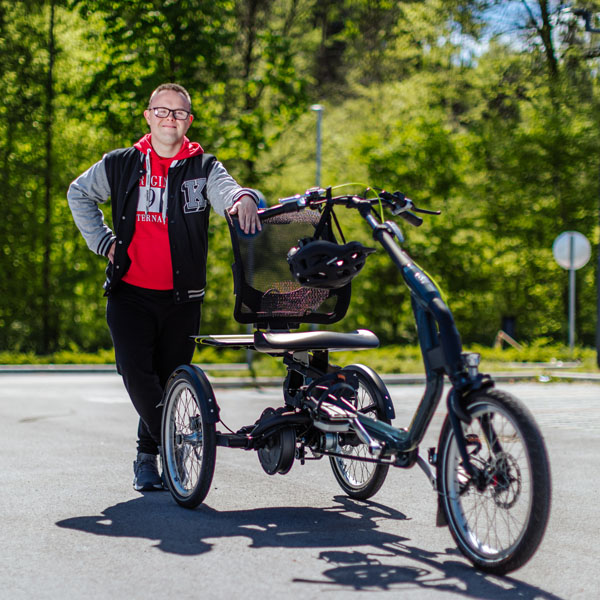Photo courtesy of the Zavod Uvid Rogaška Slatina / (Photo by: Blaž Lah and Matic Javornik)
WHEN AND WHERE
16. – 20. September 2024 at the University of Ljubljana, Faculty of Civil and Geodetic Engineering (UL FGG), Jamova cesta 2, 1000 Ljubljana, Slovenia
INTRODUCTION
Recently, much attention has been paid to sustainable mobility and promoting more environmentally friendly forms of transportation in the world and Slovenia. One of the most popular forms is cycling. Users have a growing number of different bicycle connections at their disposal. Typically, we see bicycle connections designed for healthy, adult cyclists. However, it is often forgotten that bicycle users can be very diverse. To enable social equity and promote everyday cycling for all existing and potential cyclists, vulnerable groups need to be addressed. Cycling and cycling infrastructure must be friendly, safe and accessible for children, older people and cyclists with disabilities.
The summer school is organised by the UL Faculty of Civil and Geodetic Engineering in Ljubljana in cooperation with the Faculty of Geography at the University of Belgrade. Faculties cover a wide range of expertise in the various fields needed to plan an effective cycle network and infrastructure: urban planners, traffic engineers, surveyors and geographers.
FOR WHOM IS THE SUMMER SCHOOL INTENDED?
The summer school is aimed at students of study programmes related to spatial planning and management, sustainable mobility and regional planning (architecture, urban planning, landscape architecture, geography, geodesy, spatial planning, traffic engineering, civil engineering, economics, sociology, etc.). Students of the first and second Bologna degree programmes or students of integrated Master’s programmes are welcome.
The summer school will be held in English.
AIM AND GOAL OF THE SUMMER SCHOOL
One of the most important goals of Ljubljana’s development vision is to improve sustainable transportation for all users, especially a comprehensive network of national and local bicycle connections. However, as these are not yet built everywhere and adapted to different types of users, the goal of the summer school is to examine existing and design proposals for new cycle links and other cycling infrastructure from the point of view of vulnerable groups (disabled people, children, elderly), using Ljubljana and its urban region as a case study. From the perspective of the vulnerable groups, both the possibilities of daily and recreational cycling will be addressed.
The aim of the summer school is to gain knowledge on how to plan a safe and comfortable cycling infrastructure and improve the conditions for sustainable mobility for all existing and potential users of the area. The particular focus is on the inclusion of vulnerable groups in cycling and the design of an inclusive cycling infrastructure.
The summer school will bring together national and international speakers who will share their knowledge in the areas of inclusion of vulnerable groups and planning safe cycling infrastructure and connections. In international groups, you will analyse case studies on cycling connections and accessibility from the perspective of a vulnerable user. You will propose solutions for the appropriate design of cycling connections and infrastructure.

Photo courtesy of the Zavod Uvid Rogaška Slatina
(photo by: Blaž Lah and Matic Javornik)

Photo courtesy of the Zavod Uvid Rogaška Slatina
(photo by: Blaž Lah and Matic Javornik)

Photo courtesy of the Zavod Uvid Rogaška Slatina
(photo by: Blaž Lah and Matic Javornik)
APPLICATIONS FOR THE SUMMER SCHOOL
Applications will be accepted until places are filled, but no later than July 12th, 2024. Applications will only be accepted via the online application system; neither applications nor reservations can be made by e-mail. When registering for the workshop, a letter of motivation must be submitted as part of the application form. The link to the application form can be found HERE.
Participants will be notified of their selection no later than July 19th, 2024, at the e-mail address provided in the application. In the event of changes to the implementation conditions or an insufficient number of participants, the organiser reserves the right to change the programme or cancel the summer school.
The maximum number of participants is 20. All participants will receive a certificate of participation in the summer school worth 4 KT at the end of the summer school.
ACCOMMODATION AND MEALS
For students coming from higher education institutions in CEEPUS* countries, there is the possibility of free accommodation in a student dormitory. Students who meet the CEEPUS conditions are also entitled to a scholarship of 100€. Students who do not come from higher education institutions in one of these countries must provide their own accommodation.
*Countries eligible for CEEPUS funding: Albania, Austria, Bulgaria, Bosnia and Herzegovina, Croatia, the Czech Republic, Hungary, Montenegro, Kosovo, North Macedonia, Moldova, Poland, Romania, Slovakia, and Serbia
Meals (lunches) will be provided during the summer school.
